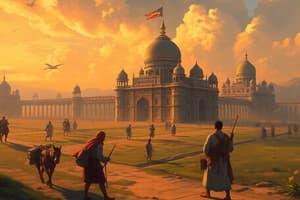Podcast
Questions and Answers
What does AD stand for in historical dating?
What does AD stand for in historical dating?
- Analogous Date
- Adjusted Date
- Anno Domini (correct)
- After Death
Historians today focus primarily on the chronological order of events rather than their causes.
Historians today focus primarily on the chronological order of events rather than their causes.
False (B)
Who divided Indian history into the Hindu, Muslim, and British periods?
Who divided Indian history into the Hindu, Muslim, and British periods?
James Mill
A __________ is a person who makes maps.
A __________ is a person who makes maps.
Match the following periods of Indian history with their respective classifications:
Match the following periods of Indian history with their respective classifications:
Which period in Indian history is characterized by the absence of significant progress?
Which period in Indian history is characterized by the absence of significant progress?
James Mill believed that British rule would hinder India's development.
James Mill believed that British rule would hinder India's development.
What process leads to political, economic, social, and cultural changes when one country subjugates another?
What process leads to political, economic, social, and cultural changes when one country subjugates another?
The era of Modern India lasted from ______ to 1947.
The era of Modern India lasted from ______ to 1947.
Match the following historians' views with their statements:
Match the following historians' views with their statements:
Flashcards are hidden until you start studying
Study Notes
Importance of Dates
- Dates are essential for recording historical events and understanding their chronological order.
- Historical events are categorized in terms of BC (Before Christ) and AD (Anno Domini).
- Understanding the sequence of events, like a king’s reign or battles, aids in comprehending historical narratives.
- Modern historiography emphasizes why events occurred rather than solely focusing on the timing of events.
Which Dates?
- Significant historical occurrences, such as wars, are often highlighted by their dates, which may shift in importance over time.
- Accounts from colonial administrators often overlook the daily lives of ordinary people, thus limiting the understanding of history.
- Dates function as boundaries that help delineate different historical periods.
Periods in History
- James Mill categorized Indian history into three periods: Hindu, Muslim, and British.
- Indian historians further refined Mill’s classification into Ancient India, Medieval India, and Modern India, widely accepted for its chronological accuracy.
- Mill viewed British rule as a means to civilize India, believing prior periods were marked by ignorance and intolerance.
- The classification of the colonial era reflects Western perspectives on progress, reason, and societal constructs.
Time in History
- Political history allows for precise dates, while social, economic, and cultural histories are harder to timestamp, reflecting the complexities of historical change.
- Four critical questions guide historical inquiry: what happened, when, where, and how; however, definite answers are often elusive.
- The colonial experience is non-linear and varies, making it difficult to pinpoint specific dates or locations for historical changes.
What is Colonial?
- Colonization involves the domination of one nation over another, resulting in political, economic, social, and cultural transformations.
- Referring to British colonial rule indicates India's subjugation and integration into the British Empire.
Studying That Suits You
Use AI to generate personalized quizzes and flashcards to suit your learning preferences.




